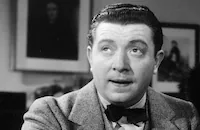Ex-Lady

Brief Synopsis
Cast & Crew
Robert Florey
Bette Davis
Gene Raymond
Frank Mchugh
Monroe Owsley
Claire Dodd
Film Details
Technical Specs

Synopsis
Helen Bauer, a beautiful young artist with modern ideas about sexual relationships, is in love with Don Peterson. The couple scorns marriage, but when Helen's conventional father, Adolphe, condemns their lifestyle, they acquiesce and marry. Soon, Don's advertising business troubles put a strain on the marriage and Helen discovers that he is seeing one of her married friends, Peggy. Helen is convinced that it is marriage that drove Don away and insists that they live separately, but remain lovers. One night when Don goes to see Helen, he finds she has a date with Nick Malvyn, a man about town. Don's jealousy sends him back to Peggy and Helen reacts by going to Nick's apartment. There Nick's amorous intentions are thwarted by the arrival of a mutual friend. When Helen returns home, though, she finds Don waiting and ready to forgive her. They reconcile their differences and agree that although marriage is not perfect, their love will survive it.

Director

Robert Florey
Cast

Bette Davis

Gene Raymond

Frank Mchugh

Monroe Owsley

Claire Dodd
Kay Strozzi
Ferdinand Gottschalk

Alphonse Ethier
Bodil Rosing
Crew

Videos
Movie Clip



Trailer
Hosted Intro
Film Details
Technical Specs

Articles
Ex-Lady
"No one has any rights about me, but me," she tells her devoted boyfriend Don Peterson (Gene Raymond) who owns an advertising agency and sometimes spends the night, but cannot convince Helen to give up her independence and marry him. Even the immigrant father who furiously confronts his daughter the morning after Don has slept over and denounces his daughter as "cheap!" can't persuade her to change her mind.
"I went away from home to be on my own," trills Helen. "I don't want to be like my mother, a 'yes' woman for some man. I want to be a person of my own."
Setting the sex comedy plot of Ex-Lady (1933) in motion, Helen finally gives in to pressure to marry and finds, instead of contentment and wedded bliss, friction and grief. In addition to marrying, Helen and Don go into business together. But their business collaboration proves disastrous and Don begins to dabble in infidelity with a married friend. In perfect tit for tat, Helen embarks on an affair with Don's advertising business rival Nick Malvyn (Monroe Owsley).
The New York Times found the film hard to take and a misuse of Davis's obvious talent, remarking that "Miss Davis had to spend an uncomfortable amount of her time en deshabille in boudoir scenes engaged in repartee and in behavior which were sometimes timidly suggestive, then depressingly naive and mostly downright foolish."
Despite the New York Times' criticisms, Ex-Lady is a remarkably progressive, contemporary story considering its 1933 release date, with some similarities to the chick flicks of contemporary times centered on the romantic travails of single city girls.
"So frank...so outspoken...so true," Warner Brothers promised in advertising for the film, and the film for once lived up to the hype.
A quintessential pre-Production Code film, made in the period between 1930 and 1934 when the Code was not strictly enforced and films were released with a remarkable degree of salaciousness and eyebrow-raising content, Ex-Lady features the icon of a liberated, empowered woman who considers herself the equal of any man. But, as is often the case with such films which defied the censors only to revert to the path of conventionality in the end, Ex-Lady's conclusion has Helen come around to the pleasures of domesticity, wifedom and a husband who is devoted to her.
The first film in which Bette Davis headlined, Ex-Lady's depiction of a determined, forceful lady with an independent spirit suited Davis's own off screen personality well. Davis was known for being just as forceful in her non-film life, with a reputation for being difficult on and off the set. The first female president of the Academy of Motion Pictures Arts and Sciences, Davis was also a cofounder, with actor John Garfield, of the Hollywood Canteen, which supported armed servicemen during World War II. In 1977 Davis was the first woman to receive the American Film Institute's Lifetime Achievement Award.
The film that really announced Davis as an actual force to be reckoned came a year after Ex-Lady, the 1934 adaptation of W. Somerset Maugham's Of Human Bondage which transformed Davis into a star. It was not, however, until 1935's Dangerous that Davis received her first of 10 Oscar® nominations (placing her second only to Katharine Hepburn for total number of Best Actress Oscar® nominations). She won an Oscar for Dangerous though she thought Of Human Bondage, in which she played a cold-hearted waitress opposite Leslie Howard, was the superior performance.
Ex-Lady was a virtual remake of the 1931 Warner Brothers Barbara Stanwyck film Illicit whose tagline was the short and sweet "She dared!"
Director: Robert Florey
Producer: Darryl F. Zanuck
Screenplay: David Boehm from a story by Edith Fitzgerald and Robert Riskin
Cinematography: Tony Gaudio
Production Design: Jack Okey
Music: Ernesto Lecuona
Cast: Bette Davis (Helen Bauer), Gene Raymond (Don Peterson), Monroe Owsley (Nick Malvyn), Frank McHugh (Hugo Van Hugh).
BW-67m.
by Felicia Feaster

Ex-Lady
Quotes
Trivia
In 1962, producer-director Robert Aldrich was preparing the prologue to What Ever Happened to Baby Jane? (1962) He chose a scene from Parachute Jumper (1933) and Ex-Lady to document the fact that the young Jane was a flop as a movie star.
Edith Fitzgerald's and Robert Riskin's story was actually an unproduced play copyrighted 1 July 1930.
Notes
Edith Fitzgerald's and Robert Riskin's play was copyrighted July 1, 1930. This was Bette Davis' first starring role. A news item in Hollywood Reporter notes that Howard Bretherton and William Keighley were considered as directors for the film before Robert Florey was assigned. Shooting lasted for eighteen days and the total cost of the film was $115,000. This is a remake of the 1931 Warner Bros. film Illicit (see below).
















